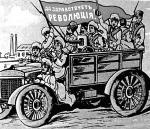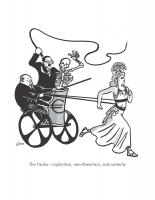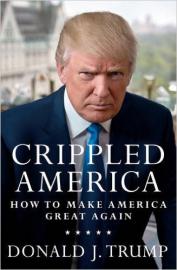Current IssueFrom the Editors
The inauguration of Donald Trump as the president of the United States opens what we fear will be one of the darkest and most dangerous periods in American history since the founding of this journal in 1961. Trump Takes Office, Resistance Takes to the Streets
Donald Trump takes office on January 20, setting up the most right-wing, racist government in modern American history, but he will not go unchallenged. That challenge is already in motion. The Rust Belt in Revolt
This year’s elections are the culmination of the long-standing economic and cultural grievances of America’s industrial workers, a subclass largely composed of white men from the Rust Belt whose factories have been asset-stripped and sent abroad and whose unions or small businesses, pensions, and prospects have been decimated. They are not the poorest of the poor—not even the poorest of the white poor. They are not from places where the economic conditions are the worst, but they are from places where uncertainty about the future of industrial jobs is most acute. "Glorious Harbinger of a New Society"The Bolshevik Revolution
One hundred years ago the most democratic revolution in history took place. Led by the Bolshevik Party, the Russian working class, allied with the peasantry and organized into mass democratic institutions—the soviets—took power. This Changed Everything—TwiceRussia, Revolution, and Counter-revolution
I
During the tumultuous years that followed the horrors of World War I, especially in the period of 1917 to the early 1920s, the Russian working class became an inspiration to workers around the world. Neoliberal Imperialism, The Latest Stage of Capitalism
One hundred years ago, in exile in Zurich during the spring of 1916, Lenin started writing one of his most important and influential works, his pamphlet on imperialism. What is the relevance of this work today? Russia and the Left
What explains the enthusiasm in certain quarters of the left for Vladimir Putin and Russia? #czarnyprotestThe Black Protest for Abortion Rights in Poland
In Poland the law on abortion is one of the most restrictive in the European Union, sex education does not exist, and contraception is both expensive and hard to obtain because a medical prescription is often needed. The Rise of the Revolutionary Left in Argentina
Night had fallen on the Atlanta Stadium in the city of Buenos Aires on November 19, and as “The Internationale” began to blare from the loudspeakers, more than twenty thousand people at the Trotskyist Left Front rally stood up, their fists held high, to sing the international workers’ anthem with a single voice. ‘Sovereignty Belongs to the People’
On December 4, 2016, the Italian electorate was asked to vote on a government-proposed constitutional reform, and the vote dealt the government and Prime Minister Matteo Renzi’s plans a ringing blow. The referendum was a political gambit on which the PM bet everything, yet 59.1 percent of voters rejected the reform. Barely an hour after the polls closed, Renzi announced his resignation. Solidarity Report from Standing Rock
[Editors’ note: The struggle at Standing Rock against the Dakota Access Pipeline (DAPL) was one of the major political mobilizations of 2016, combining the demand for Native rights with the call for environmental justice. New Politics asked Nancy Romer to cover these events for us. She was at Standing Rock from November 10-15. Remembering Martin Luther King’s Last, Most Radical Book
Marking an anniversary of a book’s publication is, appropriately, reserved for books that were widely read when they first appeared many years ago. Books we commemorate with an anniversary are ones that ushered in a new way of thinking and influenced the way society tries to make sense of the world. Martin Luther King Jr.’s last book, Where Do We Go from Here: Chaos or Community did neither of these things.1 The Rise and Fall of the Muckrakers
The Occupy movement and the Bernie Sanders campaign spotlighted once again the fact that a fairly small number of very rich people dominate the major economic and political institutions of the country. The Capitalistic Mentality and the Politics of Radical ReformA (Mostly) Friendly Reply to Michael J. Thompson
Periodization of the various versions of capitalism is tough academic work, and what follows is not meant to diminish the importance of those kinds of projects. Leonard Weinglass on The Patriot Act
The pages that follow are taken from Seth Tobocman’s new graphic biography of the radical lawyer Leonard Weinglass, Len: A Lawyer in History (AK Press). This particular section is based on a transcript of a talk that Len Weinglass gave at the 2002 Left Forum on the relationship between Nixon-era encroachments on civil liberties and the Patriot Act. 1939: Soviets Invade Poland. Defensist? Imperialist?
When the Stalin-Hitler pact triggered World War II in 1939, and Soviet troops occupied half of Poland and then invaded Finland, the Socialist Workers Party in the United States was plunged into crisis. Samir Amin’s Russian Campist Anti-Imperialism
Reflections on Opportunity LostGreece and the Syriza Experience
In very different ways, Helena Sheehan’s The Syriza Wave: Surging and Crashing with the Greek Left and Looting Greece: A New Financial Imperialism Emerges by Jack Rasmus look back over the period of the Greek debt crisis, and the parallel rise and fall of Syriza, and try to take stock. Getting Away With It: Israel and Global Occupation
At the heart of Jeff Halper’s War Against the People: Israel, the Palestinians and Global Pacification is the question “How does Israel get away with it?” In other words, how is Israel able to continually occupy Palestinian territory in contravention of international law? Sam Bottone, 1926-2016
New Politics editorial board member, socialist activist, intellectual, and labor organizer Sam Bottone, 90, died in Portland, Oregon of multiple chronic illnesses on December 30, 2016. |
Blogs & On-Line FeaturesAccelerating Imperial Decline: Trump’s America in the World
[The following article was written as a contribution to Solidarity’s pre-convention discussion.] Foreign policy elites are freaking out: “President Trump has accomplished an extraordinary amount in a short time. With shocking speed, he has wreaked havoc: hobbling our core alliances, jettisoning American values and abdicating United States leadership of the world. That’s a whole lot of winning — for Russia and China.” Those are the lamentations of Barack Obama’s national security advisor and ambassador to the United Nations, Susan E. Rice (New York Times, Saturday, June 3, 2017, “To Be Great, America Must Be Good.” The French Election
The good news this May was that French voters rejected far-right Marine Le Pen by a two-to-one margin in the second round of the Presidential election. The bad news was that France ended up electing Emanuel Macron, an efficient technocrat who consciously incarnates French capital’s need to eliminate the "French exception" and level the wages, rights and benefits of the French common people down to the average of the European Union (which includes Romania and Bulgaria). Russia, the Supposed New Cold War, and RussiagateA Letter of Engagement to the Broad Left
Fellow socialists and leftists, it is time to dispel that illusion that somehow Putin’s Russia of today is somehow positively connected to the USSR of yesterday. That simply is not the case. Grassroots Global Justice Alliance condemns Trump's Paris Agreement withdrawal
Grassroots Global Justice Alliance condemns Trump's announcement to withdraw the US from the Paris Agreement. Can “Corporate Free” Candidates Win?
Since 2004, members of the Richmond Progressive Alliance (RPA) have won ten out of the sixteen city council and mayoral races they have contested in their majority minority city of 110,000. Logic of the Bomb
Beyond Anger: Immigrants and Trump's Presidency
To understand Trump's ascendance to presidency, instead of looking into the structure of the society, we need to look into the software of the society; the way people operate culturally. It has been three months since the inauguration of President Trump and the nation still is engaged in agonized self-scrutiny to fathom the ascendance of Trump to the highest office in the country. Some explanations blamed it on the establishment’s inability to read and respond to electors’ interests. Other arguments deplored the Democratic Party for clearing the way for Hillary Clinton despite her trust problem. Other opinions maintained that Hillary Clinton did not speak to young voters, African Americans and working class. She was also censured for not addressing the real grievances; that is the economic concerns of the public. Clinton criticized the FBI for releasing the letter eleven days before the Election Day. Some explorations highlight the large number of people who sat at home and did not vote. The FBI Takes Charge: The Establishment May be Done with Trump
[Updated May 19, 2017] After nearly four months of President Donald Trump’s chaotic presidency surrounded by controversies and scandals, the American establishment has decided to take things in hand. That is the meaning of deputy attorney general Rod J. Rosenstein’s appointment of Robert S. Mueller III to serve as special counsel to investigate ties between the Trump administration and Russia. Mueller, who had served as the FBI director from 2001 to 2013 under presidents George W. Bush and Barack Obama, has both the confidence of the establishment and the political independence that will allow him to pursue the issue without fear of presidential interference.
Statement of a New Peace Coalition in Los Angeles
The Coalition for Peace, Revolution, and Social Justice (CPRSJ) aims to resist capitalism, imperialism, and authoritarianism in the Trump era. We are helping to develop a thoughtful, multidimensional, and proactive opposition to the intensifying authoritarianism that has become evident around the globe, as exemplified by Donald Trump in the U.S., Vladimir Putin in Russia, and Xi Jinping in China. We oppose NATO and U.S. imperialism because they underpin capitalist-militarist hegemony around the globe. In general, we target rampant class oppression, imperialism, racism, sexism, heterosexism, nativism, Islamophobia, and environmental destruction. Standing in Solidarity with Sarah ChambersA Teacher Who Stands Up For Kids
Sarah Chambers is an award winning special education teacher in Chicago’s Saucedo Academy. Sarah is a local leader a national figure in the fight to defend and transform public education against the corporate education reform attack. She is a relentless advocate for special education students and LGBTQ students. Sarah is a published author, organizer, and speaker on issues of education reform and social justice.
James Baldwin, Stan Weir, and Socialism
Raoul Peck’s powerful documentary “I Am Not Your Negro,” which was nominated for an Academy Award, has brought the great writer James Baldwin (1924-1987) to a new generation of Americans who may have been unfamiliar with Baldwin’s life and writings. “I Am Not Your Negro” presented Baldwin as a powerful voice of the black liberation movement, but hardly mentioned his longtime commitment not only to full equality for black Americans, but also to socialism. Baldwin wrote in No Name in the Street that he had been a "convinced fellow traveler" at 13 who had marched in the May Day parade and then became a "Trotskyite" by age nineteen. Too young to have been involved in Harlem’s Communist Party in the 1930s, he claimed to have been a member of the Young People’s Socialist League, but that has never been confirmed.
May Day: Born in the USA

For generations, May Day, the International Workers Day celebrated by working people in more than 200 countries, was ignored in the United States, the country of its origin. In fact, the annual holiday is as American as cherry pie, commemorating as it does the 1886 nationwide general strike in which U.S. trade unionists — largely foreign-born — walked off the job in support of an eight-hour workday.
Trump In Power: The First 100 Days
President Donald Trump is neither the populist champion of working-class underdogs that some of his supporters hoped, nor is he is the fascist dictator that some feared. Co-opted by the Republican establishment, he is a dangerous, authoritarian, militarist whose programs threaten the American people, world peace, and the planet. As Trump took office, the majority of Americans were anxious, worried.
The Democrats Delivered One Thing in the Past 100 Days: Disappointment
The time has come to bid farewell to a moribund party that lacks imagination, courage and gusto The distinctive feature of these bleak times is the lack of institutional capacity on the left – the absence of a political party that swings free of Wall Street and speaks to the dire circumstances of poor and working people. As the first 100 days of the plutocratic and militaristic Trump administration draw to a close, one truth has been crystal clear: the Democratic party lacks the vision, discipline and leadership to guide progressives in these turbulent times. Reports on the Resistance: Tens of Thousands March for Science on Earth Day
Tens of thousands, many of them scientists, joined the March for Science on Earth Day, April 22, in cities across the United States and around the world. There were some 400 marches in the US with crowds estimated at 20,000 in New York and Los Angeles, some 15,000 gathered on the Washington Mall, and 1,000 in Portland, Oregon. Other marches took place in hundreds of other cities around the world from London to Tokyo.
|
















 For some time now, many of us have wondered how it is that a number of left-wing writers and some political organizations could support Vladimir Putin and the Russian government’s role in international affairs.
For some time now, many of us have wondered how it is that a number of left-wing writers and some political organizations could support Vladimir Putin and the Russian government’s role in international affairs.







 The GBU-43/B Massive Ordnance Air Blast (MOAB) or “Mother of All Bombs” was dropped in Afghanistan at a time of great international tension. Sarin gas had filled Syrian hospitals with civilians, threatening to draw Russia, the United States, and their allies into direct war. U.S. warships retaliated by striking one of Assad’s air bases while Donald Trump shared dessert with China’s President Xi Jinping. Hot on the heels of their meeting, Trump (
The GBU-43/B Massive Ordnance Air Blast (MOAB) or “Mother of All Bombs” was dropped in Afghanistan at a time of great international tension. Sarin gas had filled Syrian hospitals with civilians, threatening to draw Russia, the United States, and their allies into direct war. U.S. warships retaliated by striking one of Assad’s air bases while Donald Trump shared dessert with China’s President Xi Jinping. Hot on the heels of their meeting, Trump (









 This essay was originally a talk at the conference held at the New School for Social Research on April 21-22, 2016.
This essay was originally a talk at the conference held at the New School for Social Research on April 21-22, 2016.

 Rosa Luxemburg’s defense of socialist democracy and her critique of the Bolsheviks in her pamphlet The Russian Revolution (1918) are well known. Less well known and often forgotten is her critique of bourgeois democracy, its limits, its contradictions, and its narrow and partial character. We propose to examine this critical line of thought in some of her political writings without any pretentions to completeness.
Rosa Luxemburg’s defense of socialist democracy and her critique of the Bolsheviks in her pamphlet The Russian Revolution (1918) are well known. Less well known and often forgotten is her critique of bourgeois democracy, its limits, its contradictions, and its narrow and partial character. We propose to examine this critical line of thought in some of her political writings without any pretentions to completeness.